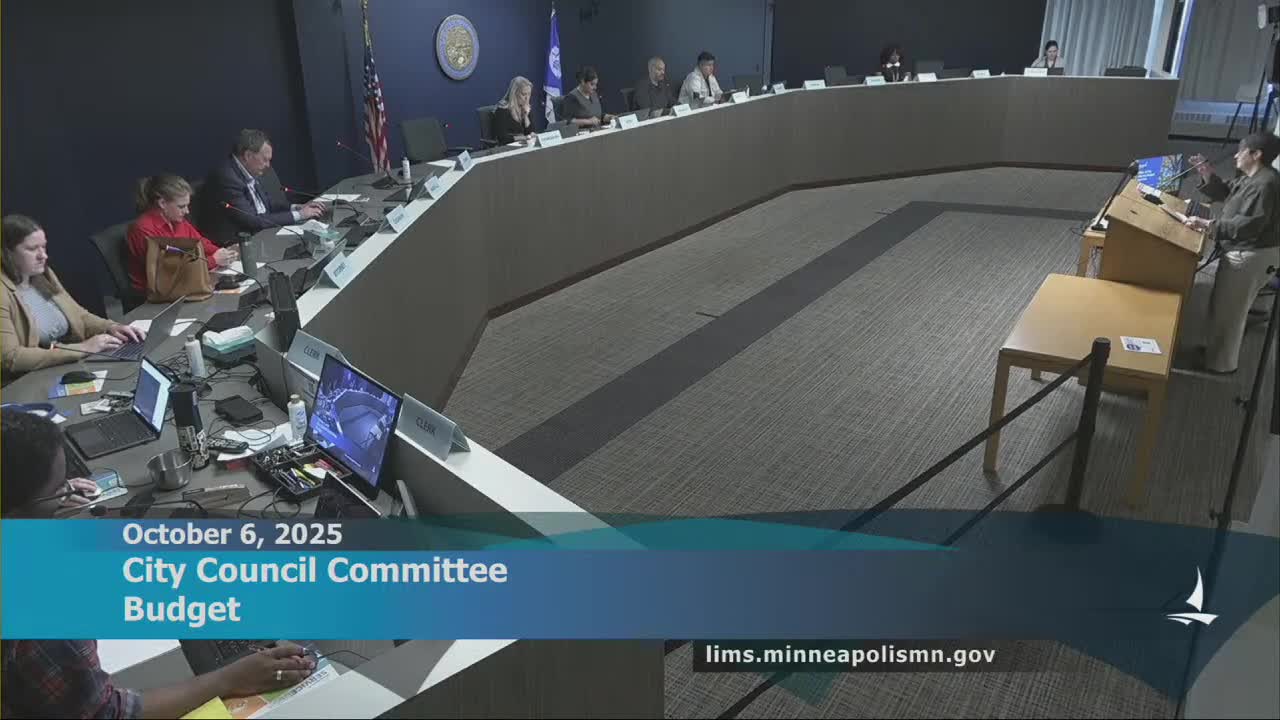City attorney outlines achievements, warns of tighter 2026 budget and staff reductions
Get AI-powered insights, summaries, and transcripts
Subscribe
Summary
City Attorney Kristin Anderson presented the office's accomplishments, public-safety work and recommended 2026 budget cuts to the Minneapolis City Budget Committee, describing program wins and planned reductions that together reduce roughly 3.0% in 2026 after a 4.0% reduction in 2025.
Minneapolis City Attorney Kristin Anderson told the Budget Committee on Oct. 6 that her office has reduced turnover, implemented paperless systems, expanded extreme-risk protection order petitions and defended city ordinances in high-profile litigation while facing continued budget reductions that cut roughly 3% from the office's 2026 mayoral recommendation.
Anderson said the office has stabilized staffing since 2022, reduced reliance on paper by deploying new criminal-division technology, and played a central role in implementing police-reform obligations under the city's settlement and consent-decree work with MDHR and ALIFA. She also described expanded use of Minnesota's extreme-risk protection orders and litigation to protect city funding as core achievements.
The presentation outlined why the budget matters: the city attorney's office recorded a nearly 4% reduction in 2025 and the mayor's recommended 2026 budget reduces the office by nearly 3%, for close to a 7% decline across two years. Anderson said those cuts translate to an overall net decrease of 3.3 budgeted FTEs in the 2026 recommendation, following a net decrease of 5 FTEs in 2025; across both years the office is operating with about 8.3 fewer budgeted FTEs than before.
Anderson described several programmatic achievements. The office has completed work to update many police policies required by the settlement agreement and consent decree; Anderson said the office has made more than 100 feedback and compliance submissions in 2025 and obtained ALIFA approval on multiple policies, including body-worn and in-car camera policies, use-of-force policy, crisis-intervention and nondiscriminatory policing policies. She also highlighted new federal litigation wins and a citywide grant-review process designed to protect the city's legal and policy interests when executing grants.
Deputy City Attorney David Bernstein described criminal-division programs and caseloads. He said the office handles roughly 10,000 criminal cases annually and that trial attorneys average about 623 cases each, a caseload he contrasted with American Bar Association guidance. Bernstein praised the office's "Brady" team that processes material subject to disclosure under Supreme Court case law and said the office has processed thousands of Brady requests year-to-date and handled records for more than ten thousand officers in that work. He also described specialized teams for DWI/drug-impaired driving prosecutions, a dedicated charging team, a full-time Brady attorney and paralegal, and multiple diversion programs including Pathway to New Beginnings and Northpointe domestic diversion.
Bernstein said the Brady process now uses a new commercial tool (Prosecutor by Carpel) alongside legacy Microsoft Access systems to filter and analyze data, and that the office automatically screens subpoenaed officers for disciplinary records and moves to in-camera, protective-order procedures when records are non-public.
Anderson explained specific 2026 reductions: elimination of paid law clerk stipends (a 2.3 FTE reduction in the civil division's "veil" unit composed of paid law clerk positions), a vacant civil-division manager position left unfilled and one vacant legal-support specialist reduction in the criminal division. Anderson described the law-clerk change as a nonessential, discretionary cut intended to avoid layoffs in essential services and said the office will continue unpaid law clerk placements through school-credit arrangements.
On extreme-risk protection orders, Anderson said the office has petitioned for 17 IRPOs and obtained 16 court-issued orders to temporarily prohibit firearm possession when a person poses a risk to themselves or others; she told council members the office plans expanded public education and partnership with the Minneapolis Police Department to increase appropriate uses of the tool.
Council members asked for operational details. Council President Pate asked whether discipline records are disclosed as Brady material; Bernstein described the office's screening process and use of in-camera review and protective orders when records are nonpublic. Vice Chair Koski asked about Outcomes Minneapolis metrics (a subject raised later by the Performance Management and Innovation director) and Anderson said the office is working with the PMI team to develop internal performance measures.
Committee chair Aisha Chugtai asked the clerk to file the presentation after questions. No formal committee vote was recorded during the presentation.
Looking ahead, Anderson said the office will continue to manage expanded legal work amid tighter budgets and asked for the committee's support for the recommended reductions so the office can continue current services.
